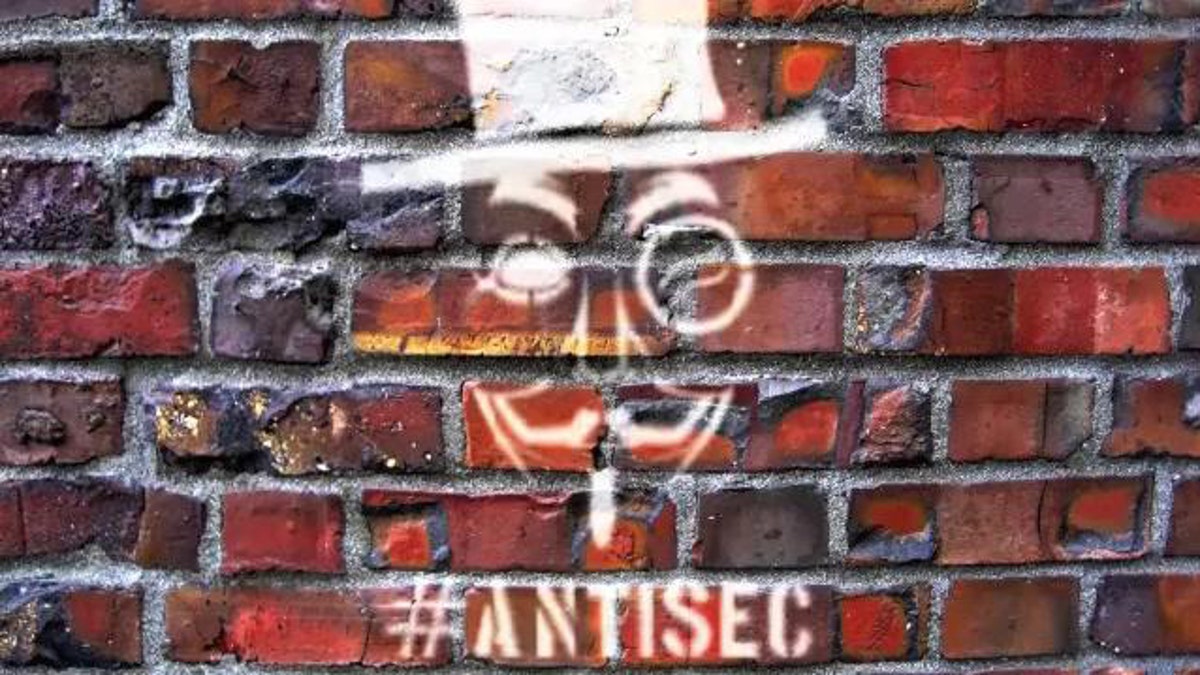
A screenshot from a video posted by the Anonymous hacking group to YouTube purporting to be the recording of a conference call between FBI and Scotland Yard. (YouTube)
A sensitive conference call between the FBI and Scotland Yard was recorded and released online by the hackers in Anonymous, the group claimed Friday.
The group released a roughly 15-minute-long recording of what appears to be a Jan. 17 conference call devoted to tracking and prosecuting members of the loose-knit hacking group and its spinoff group LulzSec. There was no classified information on the call, FBI sources tell Fox News, noting that unsecure phones are not used for sensitive information.
"The information was intended for law enforcement," the source said, and those responsible will be held accountable.
The authenticity of the recording could not be immediately verified and it's unclear how the hacking group obtained it. Names of some of the suspects being discussed were apparently edited from the recording.
"The information was illegally obtained and a criminal investigation is underway," FBI spokesman Tim Flannelly told FoxNews.com. He did not provide any additional details.
If authentic, the discussion itself appears quite sensitive. Those on the call talk about what legal strategy to pursue in the cases of Ryan Cleary and Jake Davis -- two British suspects linked to Anonymous -- and discuss details of the evidence gathered against other suspects
"We've set back arrests of Kayla and T-flow until we know what's happening," one person notes.
RAW DATA: Read a rough transcription of the conversation.
The conversation focuses for a time on hacker who's named is mentioned by obscured in the recording.
"He goes by the moniker "Tehwonhgz." He is the face behind CSL Sec (Can't Stop Laughing Security), which is a Lulzsec corner group ... he's just a pain in the bum ... we have copy of his hard drive here," one of the British voices says.
"Did anyone join on late," one of the voices asks at the end of the call.
Anonymous also published an email purportedly sent by an FBI agent which gave details and a password for accessing the call.
"The FBI might be curious how we're able to continuously read their internal comms for some time now," the group gloated in a message posted to Twitter.
Amid the material published by Anonymous was a message purportedly sent by an FBI agent to international law enforcement agencies. It invites his foreign counterparts to join the call to "discuss the on-going investigations related to Anonymous ... and other associated splinter groups." The email contained a phone number and password for accessing the call.
The email is addressed to officials in the U.K., Ireland, the Netherlands, Sweden and France, but only American and British officials can be heard on the recording.
Graham Cluley, an expert with data security company Sophos, said that hackers had been able to eavesdrop on the call because they had compromised an investigator's emails.
"No doubt the police authorities will be appalled to realize that the very people that they are trying to apprehend, could have been tuning in to their internal conversations," he wrote in a blog post.
An email to the FBI agent who sent the email was not immediately returned, while one of the British investigators on the call referred questions to Scotland Yard's press office.
Karen Todner, a lawyer for Cleary, said that the recording could be "incredibly sensitive" and warned that such data breaches had the potential to derail the police's work.
"If they haven't secured their email it could potentially prejudice the investigation," she told The Associated Press.
Anonymous was believed to have also hacked into a website run by the Boston Police Department Friday morning. BPDNews.com, a public safety resource and community outreach site, was offline as technicians worked to get it up and running again.
“It is unfortunate that someone would go to this extent to compromise BPDNews.com,” Elaine Driscoll, director of communications for the Boston Police, said in a written statement. Driscoll declined to comment on whether the hack was the work of Anonymous, citing an ongoing investigation into the matter.
Anonymous is an amorphous collection of Internet enthusiasts, pranksters and activists whose targets have included the Church of Scientology, the music industry, and financial companies such as Visa and MasterCard.
Following a spate of arrests across the world, the group and its various offshoots have focused their attention on law enforcement in general and the FBI in particular.
The Associated Press contributed to this report.
